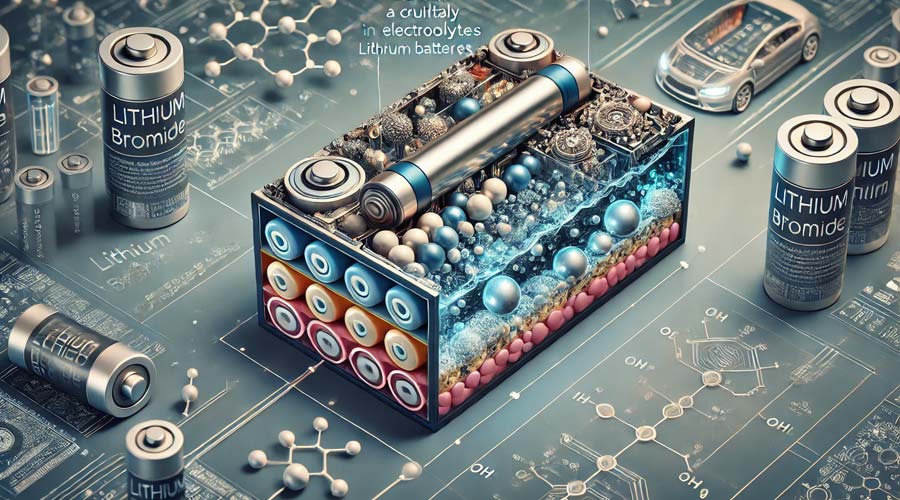Lithium bromide, a versatile and widely utilized compound, plays a significant role in the technology that powers our modern world—lithium batteries. Known for its hygroscopic nature and ionic conductivity, lithium bromide is an essential component in the electrolyte formulations of various types of lithium batteries. As energy storage becomes increasingly vital in both consumer electronics and renewable energy applications, understanding the role of lithium bromide in battery technology is more important than ever. This article explores how lithium bromide contributes to the efficiency, stability, and performance of lithium batteries.
Table of Contents
1. Understanding Lithium Bromide in the Context of Lithium Batteries
Lithium batteries are at the forefront of energy storage technology, powering everything from smartphones and laptops to electric vehicles and grid-scale energy storage systems. The efficiency of these batteries largely depends on the electrolyte—a medium that facilitates the flow of ions between the cathode and anode during the charging and discharging cycles. Lithium bromide, with its excellent ionic conductivity, serves as a key component in some of these electrolyte formulations.
Key Properties of Lithium Bromide for Battery Use:
- Ionic Conductivity: Lithium bromide enhances the movement of lithium ions, improving the efficiency of the battery.
- Thermal Stability: The compound is stable at high temperatures, which is crucial for the safe operation of batteries.
- Hygroscopic Nature: Lithium bromide’s ability to absorb moisture helps maintain electrolyte performance, especially in humid environments.
These properties make lithium bromide an ideal choice for improving the performance of lithium batteries in various applications.
2. The Role of Lithium Bromide as an Electrolyte Component
In lithium batteries, the electrolyte must allow for the smooth and efficient flow of lithium ions between the electrodes. Lithium bromide contributes to this process by providing high ionic conductivity, which is essential for fast charging and discharging cycles. Additionally, its stability under varying environmental conditions ensures that the battery can operate reliably over a wide range of temperatures.
How Lithium Bromide Works:
- Ion Transport: Lithium bromide enhances the movement of lithium ions, reducing resistance within the battery and improving overall efficiency.
- Thermal Management: The compound’s thermal stability prevents degradation of the electrolyte at high temperatures, thus prolonging the battery’s lifespan.
- Humidity Control: In environments with high humidity, lithium bromide’s hygroscopic properties help maintain the integrity of the electrolyte, preventing short circuits and other issues.
For more detailed information on lithium bromide and its applications, explore Honrel Lithium Bromide Products page.
3. Applications in Various Types of Lithium Batteries
Lithium bromide’s role as an electrolyte component is not limited to one type of lithium battery. It is used in several different types, each serving a specific purpose in the energy storage landscape.
Key Applications:
- Lithium-Ion Batteries: Used in consumer electronics, electric vehicles, and renewable energy storage, these batteries benefit from the enhanced conductivity provided by lithium bromide.
- Lithium-Polymer Batteries: Known for their lightweight and flexible form factors, these batteries also use lithium bromide to ensure efficient ion transport.
- Lithium-Sulfur Batteries: An emerging technology with higher energy density potential, lithium bromide helps manage ion flow and stability in these advanced batteries.
Each of these applications highlights the versatility and importance of lithium bromide in the evolving field of energy storage.
4. Advantages of Using Lithium Bromide in Battery Electrolytes
The inclusion of lithium bromide in battery electrolytes offers several advantages that contribute to the overall performance and longevity of lithium batteries.
Advantages Include:
- Improved Efficiency: Enhanced ionic conductivity leads to faster charging times and better overall battery performance.
- Increased Safety: The thermal stability of lithium bromide helps prevent overheating and reduces the risk of thermal runaway, a common issue in high-energy batteries.
- Extended Lifespan: By maintaining electrolyte stability, lithium bromide prolongs the operational life of the battery, making it more cost-effective over time.
5. Environmental and Safety Considerations
While lithium bromide is a valuable component in battery electrolytes, it is essential to handle it with care. The compound is generally non-toxic, but proper safety measures should be in place during the manufacturing and disposal processes to prevent environmental contamination. Recycling lithium batteries that contain lithium bromide is also crucial for minimizing waste and recovering valuable materials.
6. Frequently Asked Questions (FAQs)
Q1: Why is lithium bromide used in lithium battery electrolytes?
A1: Lithium bromide is used for its high ionic conductivity, thermal stability, and moisture absorption properties, which enhance the performance and safety of lithium batteries.
Q2: In what types of lithium batteries is lithium bromide commonly found?
A2: Lithium bromide is used in lithium-ion, lithium-polymer, and lithium-sulfur batteries, among others, where it contributes to efficient ion transport and thermal management.
Q3: How does lithium bromide improve battery performance?
A3: By enhancing ion conductivity and stabilizing the electrolyte at high temperatures, lithium bromide improves charging speed, efficiency, and battery lifespan.
Q4: Is lithium bromide safe to use in batteries?
A4: Yes, lithium bromide is generally safe when handled properly, though safety measures should be in place to prevent environmental contamination during manufacturing and disposal.
Q5: Where can I learn more about lithium bromide products for battery applications?
A5: Detailed information about lithium bromide and its applications can be found on our Lithium Bromide Products page.
7. Conclusion
Lithium bromide is an essential component in the development of high-performance lithium batteries. Its role in enhancing ionic conductivity, managing thermal stability, and ensuring moisture control makes it indispensable in various battery technologies. As the demand for efficient and reliable energy storage continues to grow, the importance of lithium bromide in powering the future becomes even more evident.
For more information on how lithium bromide can improve your battery technology, visit our Lithium Bromide Products page or contact Honrel Company for customized solutions tailored to your specific needs.









